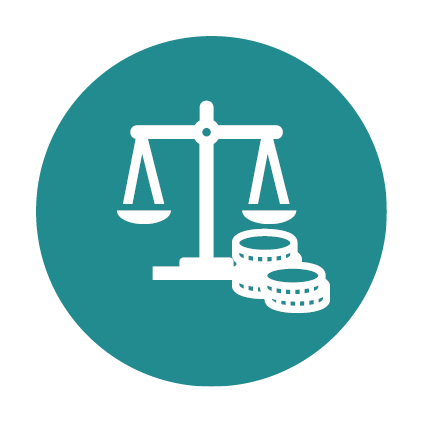Covid-19 and other crises

Successfully navigating through Crises
Whether it is the Covid-19 pandemic, the war in Ukraine or the conflicts in Yemen and other parts of the world – the crises of the past few years have brought many changes and posed with new challenges and questions for businesses, society and politics. Is a major wave of insolvencies imminent? What is the best way to help companies survive the crisis? And what are the effects of working from home & Co. on employees and productivity in the company? The researchers of the TRR 266 investigate these and other questions.
How effective are rescue measures?
When a crisis hits, many things suddenly change. These changes are often accompanied by major financial and bureaucratic hurdles for companies. Often even the entire economy is at stake. There is a great risk that struggling companies will tear each other down. That’s why governments keep deciding to step in and help companies – with a range of support measures. But how effective are these policies? Are they helping the economy out of the crisis? Or are they just a drop in the ocean? The TRR 266 examines this question for different measures employed during the COVID-19 pandemic, the war in Ukraine and the financial crisis.

What support measures helped companies during the pandemic?
Fast and unbureaucratic help – that’s what companies were promised during the COVID-19 pandemic. However, not all of the German government’s tax measures were deemed helpful by companies. That’s what the researchers of the B08 “Tax Burden Transparency” project found out. In their study, companies were asked about the tax relief measures during the Covid-19 pandemic and their tax compliance costs. The study shows that while the possibility of a special depreciation allowance and extended loss carrybacks were considered particularly helpful by the companies surveyed, the temporary reduction in the VAT rate was considered as of little or no benefit by most respondents. By contrast, companies considered a temporary reduction in their income tax burden to be useful. The study also highlights that tax compliance costs represent an enormous administrative burden for companies, regardless of times of crisis.

How effective was government Covid aid for companies?
Especially in times of economic uncertainty, it is crucial to respond quickly to the crisis with targeted and effective support measures. This can only work on the basis of solid facts. During the pandemic, the German Business Panel (GBP), which regularly surveys a large group of German companies on current economic policy issues, also asked companies how they assessed the government Covid aid. Through their surveys, the researchers were able to determine the extent to which companies were affected by the crisis and how effective the government support measures helped companies.
The first report about the Covid-19 pandemic came out September 2020 and can be found HERE.
The second report for the end of 2020 and all of 2021 can be found HERE.

Does weakening accounting rules work as an effective relief measure for banks?
During the COVID-19 pandemic, both the U.S. government and the European Central Bank decided to relax accounting standards in order to increase bank capital. This is a popular way to help banks through the crisis and, thus, to ensure the stability of the financial markets. But is this really an effective strategy? Researchers of projects A01 “Determinants of Mandatory Disclosure”, A08 “Standardization of Financial and Nonfinancial Information” and A09 “Disclosure Tasks” have used the example of the 2008 financial crisis to examine whether relaxing accounting regulations actually helps to stabilize banks in times of crisis. The study shows that such interventions are only effective if regulators implement several rescue measures at the same time in order to break a downward spiral.
How do companies and the economy behave
in times of crisis?
What began as a local crisis in one city in China soon grew into a global pandemic. The Covid-19 pandemic took over different areas of our lives in a very short time. It also had a massive impact on businesses and the economy. In several projects, TRR 266 researchers are investigating how companies and the economy act in times of crisis and how they respond to major and unexpected events (“shocks”): How are accounting decisions in companies affected by crises? How do supply and demand change? And how do insolvencies develop in Germany?

How does uncertainty affect business decisions?
How will energy prices develop? Can supply chain problems be solved? And how will the tax landscape evolve? Will there be tax increases to compensate for higher government spending during the crisis? The COVID-19 pandemic and the war in Ukraine have led to a huge increase in uncertainty at all levels. Since uncertainty has real effects on economy outcomes, this is an actual threat that can exacerbate the crisis in an already tense situation. Where there is a lack of predictability, it is difficult for companies to assess whether investments will pay off or whether it is worth hiring new employees. In case of doubt, companies refrain from investing and impose hiring freezes. However, companies are also confronted with uncertainty in non-crisis times. For example, with regard to the future development of tax policy.
Project A11 „Firm Structure, Corporate Preferences, and Expectations in Accounting and Taxation“ is therefore investigating, among other things, how companies act when they are confronted with uncertainty. In particular, how uncertainty about future tax policy shapes expectations and, in turn, affects firm outcomes such as investments. The insights help to shape economic policy in such a way that the economy becomes more resilient in times of crisis.

Insolvencies in Germany: an important indicator in times of crisis
Despite their bad reputation, insolvencies have an important function: Insolvency law removes non-viable companies from the market and helps companies that are capable of restructuring to do so – and thus make a fresh start. At the same time, the number of bankruptcies is an important indicator of the current economic situation. Therefore, project B02 “Private Firm Transparency” and the Open Science Data Center (C02) have developed an insolvency database that is publicly accessible. The database is based on official announcements by insolvency courts and shows how insolvencies in Germany develop over time, in the individual federal states and in different industries.

How do epidemic diseases affect firms?
The COVID-19 pandemic demonstrated the importance of quickly understanding how companies respond to large, unexpected shocks. But this requires reliable metrics. Therefore, project B10 “Corporate Transparency and Unstructured Soft Information: Measurement and Effects” has developed a new metric that allows researchers to systematically identify the current and expected impact of large, potentially unprecedented events in near real time.
In particular, the metric allows to identify winners and losers of the crisis, to understand the channels through which the crisis affects specific companies, and to identify firm-level demand and supply shocks resulting from the crisis.
How did Covid-19 affect processes
in the company?
The lockdowns during the pandemic also led to major changes for management as well as employees. From one day to the next many employees had to work from home. Instead of face-to-face meetings in the office, they could only communicate via digital tools. These changes raised new research questions, such as: Where is transparency dispensable? Where is it essential? How does the (lack of) transparency change the work in teams?

How did working from home change management controls during the pandemic?
The COVID-19 pandemic took companies into uncharted territory: many employees were working from home. Online meetings suddenly became the norm. But how do you manage a company when no one is on-site and everything is digital? TRR 266 researchers of project B03 “Transparency Regulation and Organizational Design” analyzed how management controls, in particular action, result and cultural controls, have changed due to working from home during the COVID-19 pandemic. They also examine how these adjustments in management styles relate to the resilience of companies. The research findings underscore the importance of a balanced and adaptable management strategy to promote companies’ transparency and resilience in a changing work landscape. The study shows that more resilient companies have adapted their control mechanisms to a lesser extent, as they have experienced less of a transparency shock. For example, departments in less resilient companies faced greater challenges in financial planning and performance measurement than similar departments in more resilient companies. Resilient companies also show a significantly higher levels of organizational trust and rely on transformational leadership.

Job crafting: advantages and disadvantages for companies and employees
In recent years, and particularly during the Covid-19 pandemic, many companies have changed the way they design jobs. Where once companies relied on a top-down job design for their employees, now employees are increasingly encouraged to participate in the design of their jobs – and to decide on important features of their job themselves. For example, the nature and scope of their tasks. The term “job crafting” has emerged to describe this phenomenon. Researchers in project A02 „Transparency Effects of Organizational Innovations“ are investigating the costs and benefits of job crafting for employees and companies, how job crafting can be optimally delegated to employees, and how the quality of performance measurement and performance-related pay impact these decisions.



